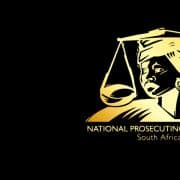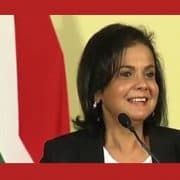|
Getting your Trinity Audio player ready...
|
By Julia Evans
First published on Daily Maverick
‘There is an awkward truth at the heart of almost all anti-corruption efforts under way today, in countless countries across the world,” said advocate Shamila Batohi, the national director of public prosecutions.
“The truth is, prosecuting corrupt public officials and private-sector players, even the most senior ones, won’t end or deter future corruption.”
Batohi, a renowned prosecutor whose career spans from apartheid-era investigations to senior advisory roles at the International Criminal Court, was speaking at the 2024 Public Protector Conference on Monday, 18 November 2024, in Kempton Park, Gauteng.
The theme of this year’s conference – hosted by the Department of Public Service and Administration and the Public Protector and funded by the European Union – is the role of oversight bodies across various sectors and how compliance contributes to holding government and state organs accountable.
Batohi was telling the conference room – attended by practitioners, researchers, civil society representatives, scholars and observers in the fields of governance, oversight, and compliance – that while prosecutions are crucial, they alone are insufficient to eradicate corruption.
“It would be comforting, indeed, to believe that prosecuting 50, 100, or even 1 000 beneficiaries of corruption and their accomplices, would vanquish corruption and restore integrity,” she said.
“But while prosecutions are essential, and I emphasise, are essential, it is not enough. The truth is that we cannot prosecute our way out of corruption.”
Reasons
Batohi argued that while criminal investigations and prosecutions are important, but never sufficient, for at least three reasons:
- Investigating and prosecuting high-level corruption is notoriously slow and uncertain;
- By focusing on specific individuals and acts, even successful prosecutions leave systemic corruption in place;
- Prosecutions are brought from outside corrupt departments and ministries.
“Without a committed and ethical leadership team inside the corrupt institution, actively reforming the culture, prosecutions alone will not shift it,” said Batohi.
She used the example of Italy’s Clean Hands operation in the 1990s to demonstrate her point. It exposed a network of corruption, convicted hundreds upon hundreds of politicians, including two former prime ministers, and led to the complete obliteration of both of Italy’s leading political parties.
“And just when Italy thought it was undergoing a revolution against corruption, one of the principal beneficiaries, Silvio Berlusconi, entered politics himself to protect himself and his empire. And he won.
“Sounds familiar, doesn’t it?” said Batohi, ostensibly referring to South Africa’s own state capture by former president Jacob Zuma and his electoral surprise with the uMkhonto Wesizwe (MK) party.
Building a culture of integrity
For Batohi, the solution lies in fostering a culture of integrity and targeting reforms within institutions. She advocated for reforms targeting specific departments and municipalities, emphasising the appointment of leaders committed to ethical practices.
Batohi highlighted steps taken within the National Prosecuting Authority (NPA) to instil an ethical culture, including the establishment of an Office of Ethics and Accountability and an ethics help desk for staff.
Acknowledging that “ethical leadership starts with the appointment of the right people at the top”, Batohi said that the NPA was actively engaging with Parliament and with various stakeholders to possibly amend the NPA Act to ensure that the appointment of senior leaders in the NPA was transparent and that the right people were appointed at these high levels.
Public Service and Administration Minister Inkosi Buthelezi echoed this in his remarks: “In order to build a capable and developmental state, we must prioritise the professionalisation of our institutions.”
He said that included implementing a competency-based recruitment process, continuous training and the establishment of ethical leadership across all levels of governance.
The role of oversight extends past government
Buthelezi also emphasised that while government oversight bodies such as the Public Protector, Chapter 9 institutions, and ombudsman offices were pivotal in delivering on South Africans’ constitutional rights, oversight had to extend beyond government institutions.
“We must also strengthen private sector compliance through entities like the Tax Ombudsman, Press Ombudsman and Ombudsman for Banking Services,” he said. “Their role in upholding accountability and protecting citizen rights complements the work of public oversight bodies, thus creating a holistic compliance ecosystem.”
Batohi agreed, saying that failures of oversight during the state capture era extended beyond government institutions.
Batohi acknowledged that state capture “was an attack from the inside, a stealthy and lethal attack, a war waged on the rule of law by the very people, and I repeat, by the very people whose job it was, and who also swore an oath to protect and promote it – including the past leadership of the NPA, various oversight bodies like Parliament as well, and other law enforcement entities.”
But she emphasised that private sector actors, including auditors, bankers and consultants were complicit, saying “they were also either implicated as enablers by failing to conduct due diligence, or as active complicit actors in capturing the state for private benefit.
“And the question we must ask is, yes – Parliament and other government institutions of accountability – what about these regulatory bodies? What did they do to ensure that there is a clean and ethical government in their sectors?”
Avoiding abuse of ubuntu
Speaker of the National Assembly Thokozile Didiza spoke about the potential for ubuntu – a philosophy of interconnectedness and mutual respect – to be misused in the political realm. She cautioned that actions such as offering gifts to communities could be misinterpreted as ubuntu when, in reality, they might be attempts to sway voters.
“How do we ensure that those cultural values in a democratic institution are not actually abused or misunderstood?” questioned Didiza, adding that measures such as declaring conflicts of interest were essential.
“But similarly, how do we understand that there is a culture that has developed over years in our society?” she continued. “How do we help our society to unlearn these practices?
“Because most of the time, when societies speak about corrupt tendencies, they often look at public representatives, officials, and government. Very little has been looked at the behaviour of those who coerce a particular behaviour.”
Thus, she said, those who were meant to strengthen democracy and oversight had to educate citizens to distinguish between rightful entitlements and corrupt practices.
“I mean, there was a very interesting debate over the weekend about the latest situation that is happening in … North West,” said Didiza, asking where one drew the line on human rights. And I think it challenges our institution 30 years on to say, how do you make sure that in the context of rights, there’s also responsibility … to make sure that you do not trample the rights of others.”
During a panel discussion, Professor Mandla Makhanya, previous vice-chancellor of Unisa, noted that while ubuntu – a value centred on dignity, compassion and social justice – was vital, assuming it was universally practised in South Africa was misguided.
“This is not only dangerous, but it hinders the consideration of strategies to bring ubuntu back in the community, the church, the school and in government,” he said.
Makhanya noted that Anthony Turton, the former vice-chair of the research advisory panel for the National Water Resource Strategy at the CSIR, criticised the overuse of buzzwords such as ubuntu, arguing they served as distractions that obscured systemic issues. He called for a paradigm shift rooted in constitutional values, where leaders were ethically bound to serve democracy.
Quoting Nelson Mandela, he said, “Since we have achieved our freedom, there can only be one division amongst us: between those who cherish democracy and those who do not.”







